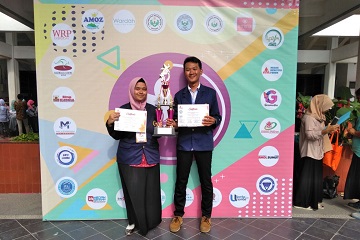A Group of IPB Students Initiated the Standardization Concepts of S, M, L Sizes for Food Menu As Already Applied in Clothes Size

Students of Bogor Agricultural University (IPB) initiated solutions for food waste problem in Indonesia. The solution initiated by M. Firman Ardiyansyah and Raden Ajeng Faadhila, students of the Business School (SB) of IPB, was to classify food in restaurant based on their sizes. Their research was on “Standarisasi Konsep Size S, M, L pada Menu Makanan di Restoran sebagai Solusi Masalah Limbah Makanan untuk Menciptakan Pembangunan Berkelanjutan di Indonesia = Standardization of Concepts of S, M, L Sizes for Food Menu in Restaurant as a Solution of Food Waste Problem to Create Sustainable Development in Indonesia”. Their research program was successfully won the 1st Winner in National English Competition, held by Himpunan Mahasiswa Jurusan Bahasa dan Sastra Inggris (HMJBSI the Association of Students of English Literture), of State University of Medan, on 2-3 March 2018. The competition was participated by various universities in Indonesia.
Firman explained that at the beginning the standardization of food S, M, L menu size was intended rice. S size is for small portions equal to 3/8 glasses of rice (equivalent to 50 grams), M size is for moderate or usual portion of the meal, i.e. 3/4 glass of rice (equivalent to 100 grams), whereas the L size is for large portion equal to 9/8 glass of rice (equivalent to 150 grams).
With this standardization concept of food size, they are expected to reduce food losses in the consumption, and it will implement the goal of sustainable development, namely Responsible Consumption and Production (responsible consumption and production).
"Hopefully the idea of the standardization of food size can be implemented in restaurants throughout Indonesia, so it will be the solution to reduce food waste problems, and encourage the realization of sustainable development," Firman said. (Wied)



